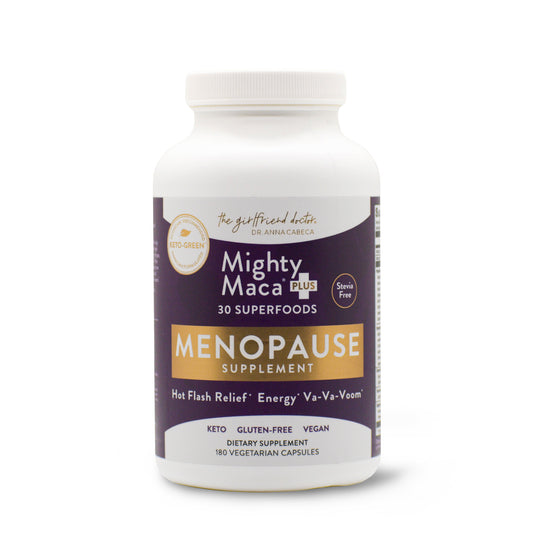Since writing my book, The Hormone Fix, I have met and talked to thousands of women who tell me how appreciative they are to discover how to optimize and balance their hormones. Once they address their sexual hormone imbalances, and their stress hormone (cortisol) and blood sugar fluctuations, they feel better. Most have been able to get off medications, get to a healthier weight, and feel energized and whole again. I can’t tell you how happy that makes me.
Many of these women have told me how the conventional medical approach just doesn’t adequately address their symptoms. Instead, they are left frustrated with a quality of life that doesn’t allow them the joy and freedom they used to have. They want to figure out the “why” behind their symptoms, and address the root causes of their struggles. They don’t want to have to count on daily pills to live a healthier, longer, more joyful life!
Women tell me they struggle with fatigue, excess weight gain, hair loss, low libido, cold intolerance, digestive issues, brain fog, fertility challenges, and more. Often these symptoms are eventually diagnosed as a thyroid condition. This isn’t surprising given the statistic that one in eight women will have some form of thyroid dysfunction over the course of their lifetime! (1)

The challenge with getting a timely diagnosis is that many conventional doctors will do inadequate thyroid related testing early on, often only testing TSH, a hormone that stimulates the thyroid. A TSH test is not enough and may delay diagnosis – and treatment - for years! When a TSH test is finally deemed positive for thyroid disease (often years after thyroid damage has been occurring) the most common therapy is most often simply a lifelong prescription for a thyroid hormone replacement medication.
Of even greater impact to so many women, greater than 90 percent of people diagnosed with hypothyroidism in the U.S. will also (eventually!) be found to have an autoimmune condition of the thyroid called Hashimoto’s disease. (2)
Yet, few people are automatically tested for this even though the tests (antibodies testing) can easily be ordered as part of a thyroid panel. Given that positive antibodies for Hashimoto’s disease can be found years before TSH levels may test as abnormal you could be losing precious time to heal your body!
Today I want to talk more about this. What tests you need, some of the most common root causes for the condition, and what natural treatments are available.
In this article I will be discussing,
- Why you can’t just take a thyroid hormone pill to fix your autoimmune disorder
- What the experts have found are common triggers for the autoimmune thyroid disease Hashimoto’s (the good news is you can remove the triggers!)
- How all of your hormones are connected (yes, estrogen swings affect your thyroid, too!)
- Test, don’t guess! (why this is so important in order to know what’s really going on with your thyroid and your immune system)
- Natural steps you can take starting today to improve your health
Why You Can’t Just Take a Thyroid Hormone Pill to Fix Your Autoimmune Disorder
The two main hormones produced by your thyroid gland — triiodothyronine (T3) and thyroxine (T4) — have an enormous impact on your health, especially relating to your overall metabolism.
A third thyroid related hormone called thyroid stimulating hormone (TSH), is released by the pituitary gland in your brain; it tells your thyroid when to release more thyroid hormones (T3 and T4) into your blood, if they are needed, to maintain optimal functionality. So when TSH is higher than normal, it can mean your body is making and releasing low and inadequate levels of T3 and T4 (so TSH tries to compensate for that). Most conventional doctors only routinely measure TSH to check thyroid health.
There are different types of thyroid conditions. When your body produces low levels of thyroid hormone as described above it is called having an underactive (“sluggish”) thyroid or hypothyroidism (remember, TSH level will test as too high although it might take many years to do so). When your body produces too high a thyroid hormone it is referred to as an overactive (“hyper”) thyroid or hyperthyroidism (and TSH level will typically test as low).

Today I am going to talk about the most commonly found condition relating to an underactive thyroid (hypothyroidism) which is an autoimmune condition called Hashimoto’s thyroiditis. There is also an autoimmune thyroid condition called Graves’ disease, which is an autoimmune condition involving an overactive thyroid (hyperthyroidism), but far fewer people suffer from this condition. The root causes for both these autoimmune conditions share a lot of commonalities and similar root causes; if you have been diagnosed with Graves’ you should continue to read about natural treatments that may help you as well.
The fact that most women having thyroid issues also have an autoimmune thyroid condition is significant in terms of treatment. It means that to resolve the thyroid condition and the underlying autoimmune condition, your treatment can’t just focus on the thyroid gland (and replacing thyroid hormone with that pill!). Hashimoto’s is an immune condition at its core, so the immune system needs to be addressed and treated as well. You need to look at what is triggering your immune system to attack your thyroid.
So if you have Hashimoto’s you will want to take thyroid hormone meds, as they will help normalize your thyroid hormone levels while you work to address the immune aspects of your condition; but those meds can’t be the only thing you do.
If you don’t address the autoimmune triggers your immune system will continue to attack your thyroid as if it were some foreign invader (like your immune system does when you come down with a virus or infection of some kind).
So how do you treat an autoimmune condition?
Eighty percent of your immune system is found in the gut, so the gut is where a lot of the action is when trying to uncover root causes and take steps to treat and resolve Hashimoto’s. Make sense?
When considering the most common triggers for Hashimoto’s you have to look at what might be happening in your gut.
Common Triggers For Hashimoto’s
The number one trigger most functional doctors point to when helping a client or patient who has Hashimoto’s is gut health. If you do nothing else, supporting improvements to your gut health will help your autoimmune condition. Resolving your autoimmune condition will reduce your body’s inflammation and ongoing thyroid destruction and will help you feel better.
Years ago I had the honor to meet a great physician, gastroenterologist and research scientist, Dr. Alessio Fasano. He is world-renowned in the area of treating gluten-related disorders, including wheat allergy, gluten sensitivity and celiac disease.
Dr. Fasano did extensive research and identified that all autoimmune diseases – including Hashimoto’s and Graves’ disease - shared three common factors:
- A genetic susceptibility
- One or more root cause triggers
- Gut permeability (“leaky gut”)
He identified that the body’s intestinal epithelial barrier (gut lining) controlled the body’s ability to detect and tolerate itself versus outside pathogens. When this lining broke down, in genetically susceptible people presented with some sort of environmental trigger(s), autoimmune conditions could occur. Autoimmune responses could then be directed against different organs causing damage to that organ’s tissue as well as loss of function. In the case of Hashimoto’s that organ is the thyroid. (3)
And what common triggers were found to break down the gut lining?
One key trigger identified in Dr. Fasano’s research was found to be reactive foods such as gluten. Along with gluten’s effects on the gut, he identified that bacterial pathogens could cause the release of zonulin, associated with gut barrier breakdown. (4) Other environmental toxins were also found to contribute to leaky gut, such as endocrine disruptors found in cosmetics and personal care products, as well as environmental toxins such as formaldehyde or toxic mold often found in homes. Now, years later we know from the research that lingering dormant infections (Epstein-Barr, the virus that causes mononucleosis, being a common one), nutrient depletions (selenium, zinc and vitamin D are a few key ones) and even stress (the effects of cortisol) may all contribute to leaky gut.
Dr. Fasano’s research also pointed out that if you take away any of these three factors (obviously you can’t remove genetic susceptibility but you can remove triggers and work to heal a leaky gut) the autoimmune condition can be repaired and resolved. (5)
So that’s important to remember! You can remove triggers and you can repair your gut health. And while I can’t cover all of the common triggers in detail in one article, here is an initial list to consider:
Common Hashimoto’s triggers
- Gluten, dairy and other reactive foods (and don’t forget that a highly processed, high sugar diet creates issues with the gut as well).
- Toxin exposures (everyday environmental exposures, medications such as oral contraceptives and antibiotics, endocrine disruptors and excess estrogen) have been associated with thyroid dysfunction. (6)
- Heavy metals such as mercury (including dental related exposures); mercury has been found in thyroid glands and linked to increased thyroid antibodies.
- Infections (Lyme is one but there are many others including Epstein-Barr and H. pylori.) – while common, these may require guidance by a good functional medicine clinician as you often need protocols (even antibiotics) to eradicate a pathogen prior to focusing on healing from its damage to your gut, thyroid and overall health!
- Stress – many people underestimate the effects of stress, but remember it is linked to leaky gut and impacting overall hormone imbalances.
- Mold – this is an often overlooked trigger yet is becoming more pervasive given current building practices (tightly constructed and unvented homes, lots of synthetic materials being used, etc.). I’ve had serious issues relating to mold and my thyroid health over the years due to the weather in Georgia as well as the hurricanes. I’ve always had some thyroid concerns which I monitor and manage to control with diet and lifestyle interventions, but my TSH shot up to 5.07 mIU/L a few years ago due to mold exposure (and stress, I had to literally move 5 times during one hurricane season!!). My other thyroid markers were bad, too. It is great, however, to see how just changing a few things (got strict with my Keto-Green® diet and lifestyle program (learn more in my book, The Hormone Fix) including supporting my liver, detoxing and getting rid of both mold and stress, helped get my TSH back to a healthy 0.55 mIU/L (and my other markers all normalized at more optimal levels, too).
- Difficulties with detoxing – this is so important…the liver filters your hormones and metabolizes them; it filters out harmful toxins; you absolutely need to support your body’s ability to detox by supporting the liver and gut with key nutrients (which I’ll talk about under natural treatments).
So we’ll talk more about how you can get started on this should you have already been diagnosed with Hashimoto’s or Graves’ disease. But first, let’s talk about why so many women are affected by thyroid disease and how you can find out if the symptoms you are experiencing are due to a thyroid condition such as Hashimoto’s. Again, a TSH test is not enough!

How All Of Your Hormones Are Connected
If you’ve read my blog before you know how all of your hormones are interconnected and how an imbalance in one can cause a ripple effect throughout the others. One example is cortisol, the stress hormone produced by your adrenals. This hormone can cause havoc with your sexual hormones, your blood sugar and insulin levels, and can shut down your thyroid as well.
Cortisol has been linked to increases in zonulin, a substance related to the breakdown of the intestinal barrier, resulting in greater gut permeability, systemic inflammation and disease. (7) Stress is most definitely a trigger for Hashimoto’s that I see with my clients; the good news is there are many things you can do to better control your stress response (I’ll talk about a few in a moment). Cortisol levels can also impact your sexual hormones and blood sugar/insulin levels.
Another example of how your hormones are all interlinked (which also perhaps explains why so many women have thyroid issues during their life) is the effect of estrogen on thyroid function.
During the stages of life when you experience higher levels of estrogen (for instance, when taking the pill; during pregnancy; when taking estrogen hormone replacement therapy; and during conditions of estrogen dominance, which is common in Hashimoto’s), the thyroid hormone can get suppressed. This happens when excess estrogen causes estrogen-specific proteins to bind to thyroid receptors, blocking free and circulating thyroid hormones from binding themselves (resulting in less thyroid hormone availability).
In addition to stages of life when your estrogen levels increase, your food, personal care products, cosmetics, and overall environment may cause you to be exposed to greater numbers of xenoestrogens. These endocrine disruptors add to your estrogen “burden” and are often a trigger for imbalances in both thyroid hormones and sexual hormones.(8)
Extra levels of estrogen may also arise in women with Hashimoto’s disease because their liver function is impaired, preventing efficient removal of toxins. Those who have the MTHFR gene mutation - which affects methylation - can be particularly affected in regards to their ability to remove toxins and excess estrogen.
It sounds paradoxical, but with ED (Estrogen Dominance) a woman’s estrogen level can actually be low (for instance, a woman who is in menopause may have low estrogen levels), but if her progesterone level is also very low, the estrogen to progesterone ratio can still be off, resulting in estrogen dominance symptoms. A woman’s progesterone levels start to decrease in her 30s (note that cortisol and insulin issues can make progesterone receptors less sensitive, further compounding this reduction in her levels). ED is common in Hashimoto’s as well as PCOS (polycystic ovary syndrome), and is often the underlying root cause for women who have endometriosis, fibroids, ovarian cysts, and painful periods, often leading to the need for a hysterectomy. (9)
Test, don’t guess. What’s really going on with your thyroid?
I will review the key labs you should have done, but I would like to emphasize an important point first: share your symptoms with your doctor, but also recognize that there is not an agreed-upon list of symptoms for Hashimoto’s disease. You may feel like you have a variety of random, nonspecific symptoms because diagnosing the root cause is difficult.
So if your doctor says you don’t have Hashimoto’s simply because you don’t have “symptom X”, I’d suggest you still push for a thyroid panel (and maybe find a new doctor, hopefully one focusing on functional medicine).
Some women will have fatigue and joint/muscle pain, others won’t. Some may keep gaining weight, others won’t. Some may have drooping eyelids, dry skin or hair loss; others won’t. Digestive issues are common (like irritable bowel syndrome or constipation) but they aren’t absolute. Migraines are common, but again, everyone will be different. That’s why adequate testing is really the only way to know how to proceed to improve upon your health.
Like I mentioned earlier, the conventional medicine test for thyroid health is TSH. But this is not the best lab for thyroid health diagnosis purposes for several reasons:
- TSH lab testing does not measure thyroid antibodies which is the best and earliest indication of having the autoimmune condition of Hashimoto’s.
- TSH levels may not test as abnormal for years after you test positive for thyroid antibodies (and in the meantime your thyroid may be being destroyed as your body attacks itself).
- Current lab ranges used for “normal” TSH levels, by conventional doctors and labs, are outdated and not based on optimal thyroid health (they were, in fact, based on people with unhealthy thyroids). Better to use functional medicine’s measurements which are based on healthy thyroids and optimized levels of thyroid hormones.
- Getting the incremental thyroid hormone testing should be easy and inexpensive (often covered by insurance). If your doctor won’t order them you can order them yourself at a site such as UltaLabs (I’ve set up a full thyroid panel for you here at a special discounted price). Talk to your doctor and your insurance company to see how you can get the additional tests covered.
If you look at the UltaLabs test panel you will see the tests and markers that I recommend. While you will see different ranges specified as “normal” by different labs and even by different thyroid experts I have provided my own suggested ranges for “optimal” levels of key tests based on research and my own clinical findings.
T3 and T4 are the two main thyroid hormones although T3 is the biologically active hormone. T4 is actually converted to T3 in the body for use (and sometimes this conversion is impaired). I look more at Free T3 and Free T4 as I feel they are a better reflection of overall thyroid hormone function.
T3 Free (triiodothyronine) - The optimal range we want to see is between 3 – 4.2 pg/mL.
T4 Free (thyroxine) - The optimal range we want to see is between 1.0 – 2.0 ng/dL.
People can have normal T4 levels but low T3 levels, so it is important to test for both.
TSH (thyroid stimulating hormone) - The optimal range we want to see is .4 – 2.0mIU/L.
The next two tests (Tg and TPO) measure the antibodies that are the markers of autoimmunity seen in Hashimoto’s. Any positive results let us know that the immune system is likely attacking the thyroid gland. Although some people having Hashimoto’s won’t have antibodies, most people do and in general, the higher the level of antibodies the worse the condition is (in terms of ongoing damage to the thyroid).
Tg (Thyroglobulin antibodies) – The optimal range we want to see is anything below 1.0 IU/mL.
TPO (Thyroid Peroxidase antibodies) – The optimal result we want to see is anything below 10 IU/mL.
Thyroid ultrasounds: A simple blood test can tell you a lot. I do, however, also recommend that if someone is diagnosed with a thyroid disorder that they also get an ultrasound. People with thyroid diseases are at higher risk for other complications including thyroid cancer, and so I always will do a thyroid ultrasound to truly see structural things that might be going on that we can’t otherwise see.
Possible trigger identification tests
There are tests that can also be helpful in identifying triggers. I may need to write a separate article on those at some point in the future as there are many different tests specific to varying types of triggers (infections, toxins, heavy metals, food sensitivities, etc.).
Just a few you might discuss with your functional doctor include: Food sensitivity testing, stool testing to identify common infections and gut issues (such as small intestinal bacteria overgrowth), cortisol/adrenal testing (stress), and any number of tests for various environmental toxins such as mold. For questions about my recommendations for such tests, join my Facebook community and just ask!
Four lab results every woman should know.
I also always recommend the four key tests discussed in this previous article on my blog; the results on these four tests ensure you know,
- Your body’s current inflammatory state
- How your immune system is doing
- If you are at risk for blood sugar control or insulin issues
- How well your body is dealing with its stress level
- If you are supporting your body’s heart, bone, brain and breast health
- If your hormones are balanced and supporting a healthier and happier life!
You can get these for minimal cost, here is the 4 key marker test panel online that you can order yourself even without your doctor’s prescription if they won’t order it for you (although they are fairly standard for functional doctors). There are many more details as well as optimal level info, etc. on the earlier blog.
Natural Steps You Can Take Starting Today
First get your thyroid adequately tested (beyond your TSH level)! Antibody testing is particularly important for early diagnosis.
Then, the most important thing you can do is address your gut dysfunction as that is one of the three requirements for having an autoimmune condition…start healing your gut and find your triggers and you can naturally improve and even potentially resolve your condition.
The best ways to heal your gut, remove common triggers and improve your autoimmune condition are,
- Eat a healthy, anti-inflammatory alkaline diet that removes reactive foods such as gluten. I wrote an earlier article that focuses on how women having thyroid issues can benefit from my Keto-Green diet and lifestyle program. I highly recommend you take the time to read it. I discuss some of the concerns I’ve heard – specifically from my thyroid clients and community – relating to potential changes to T3 levels while eating a low-carb diet, and more thyroid specific points. Support a healthier gut microbiome by taking a high quality daily probiotic; a diverse and healthy microbiome has been found to help with estrogen detoxification as well (important for breast health, too).
- Detox, detox, detox…(did I say “detox!”?) – Along with eating a Keto-Green diet having lots of greens and cruciferous veggies (they are safe for most people having thyroid issues despite common belief) to naturally detox your system I suggest two additional detoxifying formulations as well:
- Liver and detox support – My Keto Alkaline Detox Support contains N-acetyl-L-cysteine (NAC), methylsulfonylmethane (MSM), glucosinolates, silymarin and other nutrients which support both phase I and phase II detoxification while offering antioxidant protection.
- Vida Optimal Balance for estrogen and xenoestrogen detoxification – read much more about the importance of estrogen detoxification at the linked article on breast health. Zenful is a wonderful formulation that specifically supports estrogen detoxification and healthy breasts.
- Are your zinc or selenium levels too low? Zinc is vital for gut health, immune function and supports the healthy conversion of T4 to T3 thyroid hormones. Zinc also helps keep leaky gut at bay. Most people who have hypothyroidism are deficient (many people who don’t have thyroid issues are as well). Selenium levels have also been correlated with thyroid function in people having hypothyroidism as it also supports healthy conversion of T4 to T3. (10) It is a common nutrient deficiency that I have seen with hypothyroid patients and clients. When I see either a low free T4 or low free T3 on blood tests the first supplements I recommend to people are selenium and zinc. You can also try Brazil nuts and oysters! I recommend Designs for Health’s Zinc Supreme or Metabolic Synergy (contains both zinc and selenium). Ordering instructions can be found here.
- Go as toxin free as you can, to reduce your body’s overall burden, in your environment, skin care products and your food. Check out EWG.ORG for information relating to how to do this.
- Fun ways to boost your immune health: Diet and nutrients are key, but so is incorporating activities into your routine that improve your stress resilience, reset your circadian rhythm (controls your hormones and your mood!) and support a less inflammatory lifestyle. Here is a fun article on boosting your immune system that talks about ways to do so (including increasing your heart rate variability, using essential oils, and enjoying forest bathing and pampering yourself!)
- Embrace sleep. I love my Better Brain and Sleep supplement as well as my Balance PPR Cream (provides you progesterone, relaxes and calms your mood). Here are some other tips to improve your sleep.
- Stress management: Mental detox is important, too (check out this article for suggestions on how to truly mentally detox). To reduce stress I like hot yoga and infrared sauna (both are also great support for detoxing!) as well as HeartMath® and simply doing things that produce greater levels of oxytocin (which counters all of that cortisol). Take my free oxytocin quiz to see if you are deficient in this all-important hormone. Support your adrenals and stress response with my alkaline superfoods green drink, Mighty Maca® Plus.
Final Thoughts on Addressing Your Thyroid Health
You need to know how healthy - or not - your thyroid is so you can implement the right next step to feeling better (this is why early thyroid antibody testing is important!).
Most women having hypothyroid issues have Hashimoto’s disease, an autoimmune condition. Simply taking a thyroid hormone pill can’t address an issue of the immune system. Taking thyroid hormone replacement medication can help normalize your thyroid but you’ll need to address the autoimmune triggers and/or your leaky gut in order to get better.
Understanding common triggers – and addressing them – has been shown to help. Along with doing things like: removing reactive foods like gluten (dairy has always been a problem for me); gaining better control over stress management; and addressing common nutrient deficiencies, you need to start thinking about other potential triggers (infections, mold, toxins such as heavy metals, etc.). While you can address many common triggers yourself (diet, stress, reduce toxins, etc.) most people will benefit from working with a good functional doctor to help look for, test for, and resolve other more complex triggers such as infections, heavy metal issues, mold and the like..
Remember the three conditions necessary for an autoimmune condition (genetic susceptibility, triggers and gut permeability)…you do have control over two of these!
Educating yourself on Hashimoto’s can help you identify your triggers! I have a number of peers in the thyroid space and following any of them will help you learn much more about your thyroid and autoimmune condition. Just a few are Dr. Alan Christianson, Dr. Amy Myers, Izabella Wentz, and Dana Trentini.
And feel free to ask me questions as well. As The Girlfriend Doctor I am ready to help you live your healthiest and happiest life. Remember, you can ask me anything.
REFERENCES:
1) https://www.thyroid.org/media-main/press-room/
2) https://pubmed.ncbi.nlm.nih.gov/3066320/
3) https://pubmed.ncbi.nlm.nih.gov/22109896/
4) https://journals.physiology.org/doi/full/10.1152/physrev.00003.2008#B53
5) https://pubmed.ncbi.nlm.nih.gov/22109896/
6) https://www.ncbi.nlm.nih.gov/pmc/articles/PMC4702494/
7) https://www.sciencedirect.com/science/article/abs/pii/S0301051118303302
8) https://www.ncbi.nlm.nih.gov/pmc/articles/PMC3469971/







